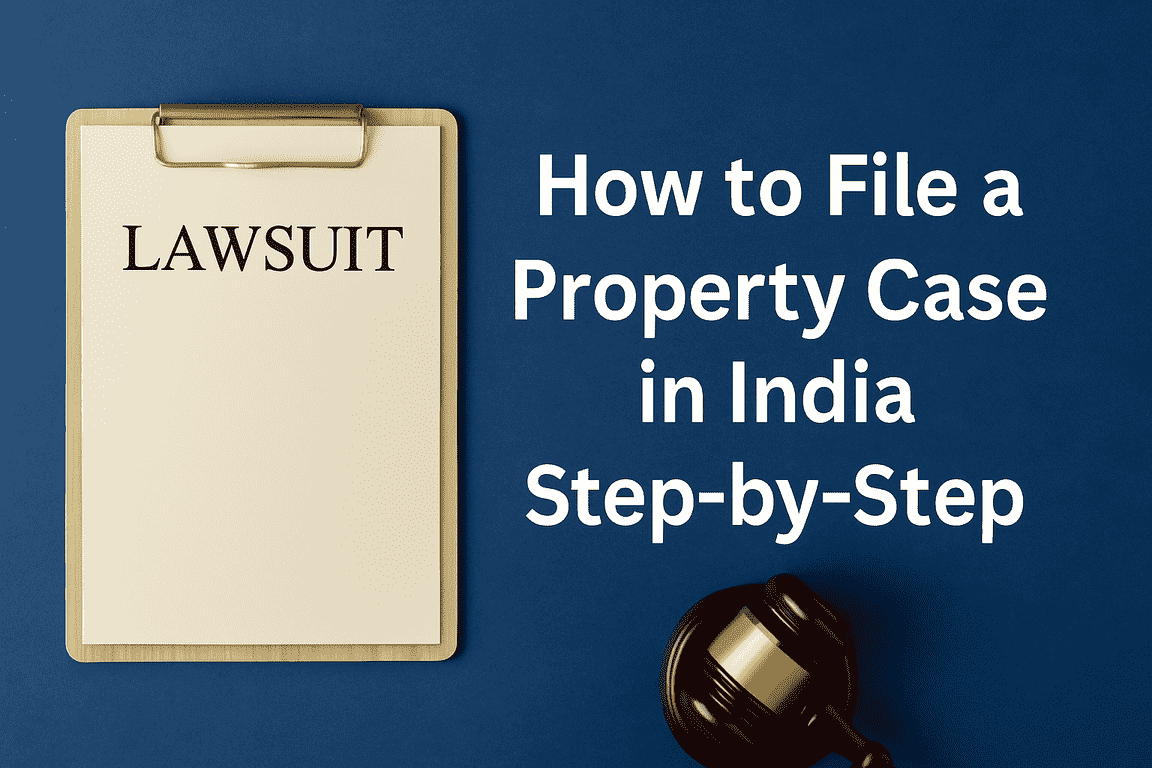
Step-by-Step Guide: Filing a Property Case in India
Introduction
Property disputes are among the most frequent legal challenges faced in India. Whether it’s disagreements over ownership, possession, or boundary issues, knowing the correct way to file a property case is crucial to protecting your rights.
If you’re wondering how to move forward, this guide will walk you through each step, ensuring you understand the process clearly. Plus, discover how Legals365 can make your legal journey smooth and successful.
Steps to File a Property Case in India
1. Recognize the Type of Property Dispute
First, identify the nature of your conflict:
- Ownership disputes
- Illegal possession
- Partition suits
- Breach of sale agreement
- Tenancy issues
Example: Two siblings disagree over inherited property shares. Filing a partition suit is the solution.
2. Organize Essential Property Documents
Prepare:
- Sale Deeds
- Title Deeds
- Mutation Certificates
- Will or Inheritance Proofs
- Lease Agreements
- Tax Receipts
Tip: Strong documentation supports your claim and increases your chance of success.
3. Consult a Specialized Property Lawyer
Property cases are technical. A lawyer helps you:
- Understand your rights
- Identify the right remedy
- Draft legal documents
- Navigate court procedures
Choose a verified lawyer who has experience handling similar disputes.
4. Send a Legal Notice
Often, a legal notice can prompt a settlement and avoid court battles. It:
- Sets the legal ground
- Offers the other party a chance to respond
- Strengthens your position if the case goes to court
5. Select the Appropriate Jurisdiction
The case must be filed where the property is located, in:
- Civil Judge (Junior Division) Court for lower-value disputes
- District Court or High Court for high-value matters
Filing in the wrong jurisdiction delays your case unnecessarily.
6. Draft and File a Plaint
Your plaint outlines:
- Nature of the dispute
- Facts supporting your claim
- Specific relief sought
It must be properly drafted, signed, and supported with documentation.
7. Pay Court Fees and Stamp Duty
Court fees are calculated based on the property’s value and differ by state.
Tip: Incorrect fees or stamp duties can lead to your case being rejected.
8. Summons Issued to Defendant
After filing, the court issues a summons to the opposing party, compelling them to appear and respond.
9. Defendant’s Written Response
The defendant must file a written statement contesting or admitting the claims.
Your lawyer prepares to:
- Address counterclaims
- Highlight inconsistencies in their defense
10. Evidence and Trial
Both sides:
- Submit documentary evidence
- Present witnesses
- Undergo cross-examination
The court examines facts and legal arguments to determine the case.
11. Final Judgment
The court may:
- Declare ownership rights
- Grant partition or possession
- Award damages
- Issue injunctions
12. Execution of Court Decree
If the losing party does not comply, an execution petition can be filed to:
- Enforce possession
- Attach or sell property
- Recover awarded compensation
How Legals365 Supports You
Legals365 helps by:
- Connecting you with verified property law experts
- Assisting with documentation and case analysis
- Managing case filings and hearings
- Ensuring regular updates and strategy discussions
We make your property case journey simpler, faster, and legally strong.
Conclusion
Filing a property case in India requires knowledge, preparation, and expert legal assistance. Understanding each step ensures that you’re in control of the process.
If you are ready to defend your property rights, trust Legals365 and Online Noida to guide you every step of the way.
Hashtags:
#PropertyDisputeIndia #PropertyCaseFiling #LandDisputeIndia #PropertyLawyerIndia #CivilSuitForProperty #LandTitleDispute #LegalPropertyRights #PropertyOwnershipCase #CourtProcedureIndia #VerifiedLawyers #LegalHelpIndia #FilePropertyDispute #PropertyLitigation #StepByStepGuide #Legals365 #OnlineNoida
